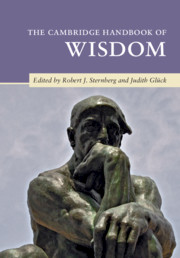Book contents
- The Cambridge Handbook of Wisdom
- The Cambridge Handbook of Wisdom
- Copyright page
- Dedication
- Contents
- Figures
- Tables
- Contributors
- Preface
- Part I Foundations of Wisdom
- Part II Conceptions of Wisdom
- 5 Wisdom of the Crowd
- 6 Wisdom As Self-Transcendence
- 7 Wisdom As a Personality Type
- 8 Why People Often Prefer Wise Guys to Guys Who Are Wise
- 9 The Distinction between Personal and General Wisdom
- 10 Wise Reasoning
- 11 Practical Wisdom
- 12 Wisdom As State versus Trait
- Part III Measures of Wisdom
- Part IV The Development of Wisdom
- Part V Cultural Perspectives on Wisdom
- Part VI Wisdom and Other Psychological Constructs
- Part VII Wisdom in Action
- Part VIII Conclusions
- Index
- References
8 - Why People Often Prefer Wise Guys to Guys Who Are Wise
An Augmented Balance Theory of the Production and Reception of Wisdom
from Part II - Conceptions of Wisdom
Published online by Cambridge University Press: 15 March 2019
- The Cambridge Handbook of Wisdom
- The Cambridge Handbook of Wisdom
- Copyright page
- Dedication
- Contents
- Figures
- Tables
- Contributors
- Preface
- Part I Foundations of Wisdom
- Part II Conceptions of Wisdom
- 5 Wisdom of the Crowd
- 6 Wisdom As Self-Transcendence
- 7 Wisdom As a Personality Type
- 8 Why People Often Prefer Wise Guys to Guys Who Are Wise
- 9 The Distinction between Personal and General Wisdom
- 10 Wise Reasoning
- 11 Practical Wisdom
- 12 Wisdom As State versus Trait
- Part III Measures of Wisdom
- Part IV The Development of Wisdom
- Part V Cultural Perspectives on Wisdom
- Part VI Wisdom and Other Psychological Constructs
- Part VII Wisdom in Action
- Part VIII Conclusions
- Index
- References
Summary
- Type
- Chapter
- Information
- The Cambridge Handbook of Wisdom , pp. 162 - 181Publisher: Cambridge University PressPrint publication year: 2019
References
- 41
- Cited by



